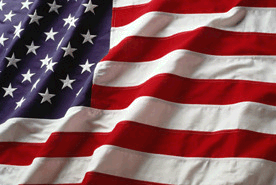 .Arlington
Cemetery.
.Arlington
Cemetery.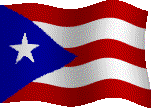
September 20, 2000
Click on photos
 .Arlington
Cemetery.
.Arlington
Cemetery.
September 20, 2000
Click on photos
.....
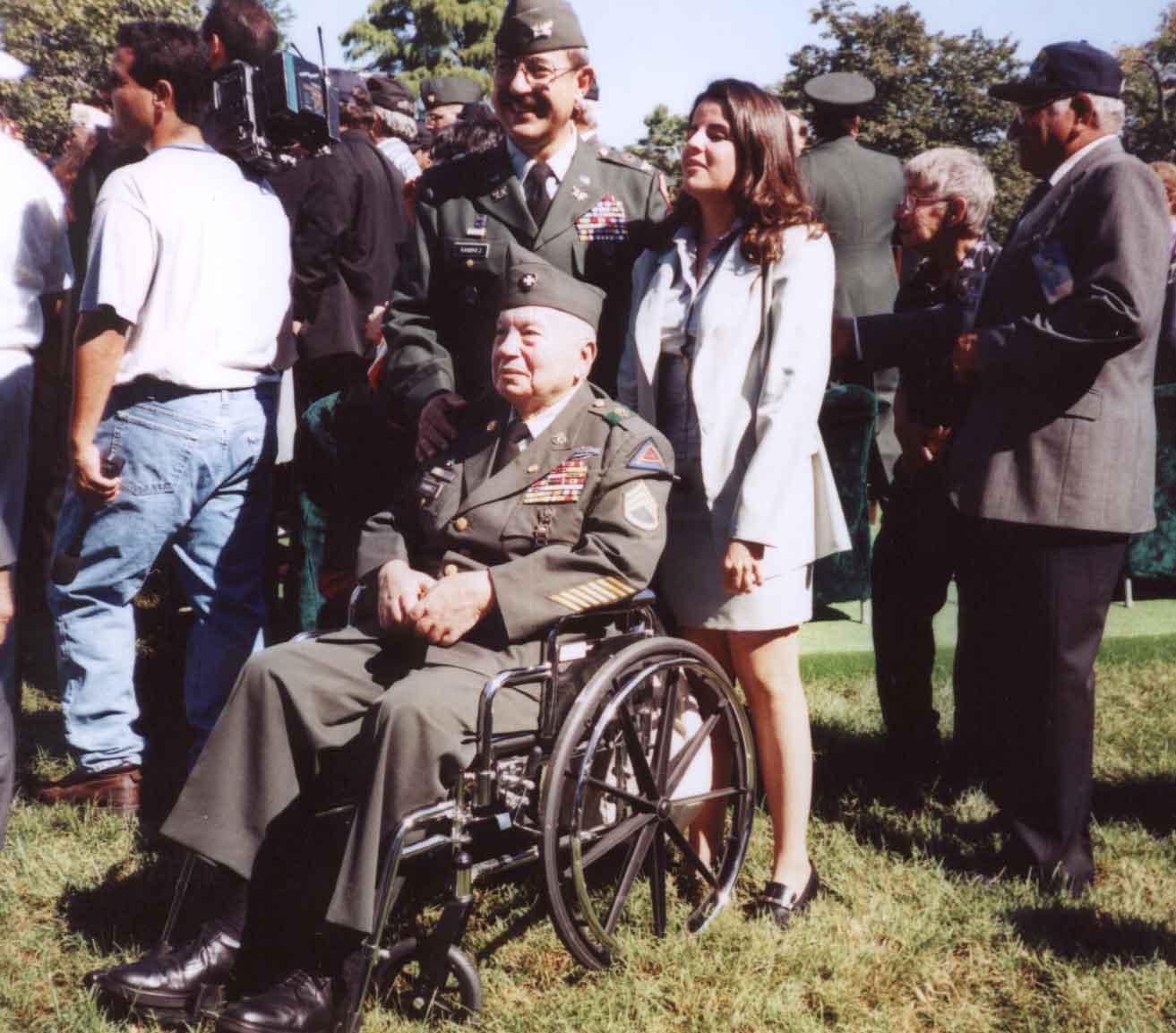
. ....
.....
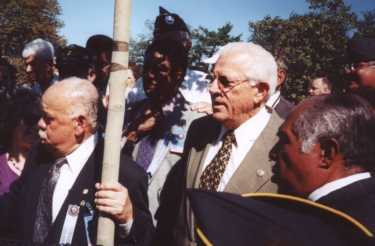
.......
......
......
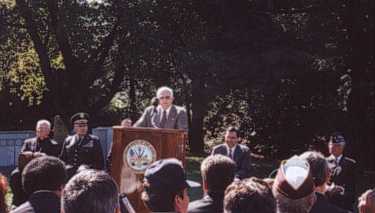
Remarks by The Honorable Louis Caldera
Secretary of the Army
Congressman Romero-Barcelo, President Alicea (65th Infantry Association).Distinguished guests, ladies and gentlemen, and especially veterans of the 65th Infantry Regiment and their families.
Good morning. We are here to render honors to veterans of the 65th Infantry Regiment and the more than 60,000 Puerto Ricans who served our nation so well at the outbreak of the Cold War, in Korea.
In the Forgotten War, the Army fought not only the deadly troops of North Korea and China but also the powerful forces of prejudice and discrimination that had so long divided our soldiers into two armies, one white, one minority. The soldiers of the 65th were fighting to protect the people of South Korea even as they struggled against injustice in the ranks of the military that they loved and served so well. They would win both battles, but not without cost. Fifty years ago last month, soldiers of the 65th regiment had scrambled up the gangplank of the Marine Lynx, in San Juan harbor, taking in their last sight of the island paradise they called home. La Fortaleza (the fortress mansion of the Puerto Rican Governor) and El Morro (fortress castle at the entrance to San Juan) stood strong and imposing in the warm Caribbean sunlight, enduring symbols of the independent spirit of the Puerto Rican people and their proud warrior heritage. The regiment left home with high hopes, and in three years of combat, they would amass a record of battlefield success that any fighting unit would be proud to own. Stepping off their troop transport in Korea, the 65th was thrown almost immediately into combat. But the superbly trained and motivated "Borinqueneers" [Bo-RIN-ka-NEERS] were up to the challenge, easily winning their first engagement. They more than fulfilled the expectations of Col. William Harris, their commander and a veteran of WWII, who proclaimed that "they were the best soldiers I had ever seen." It was a pattern of success that would eventually earn them a Presidential and a Meritorious Unit Citation and over a thousand individual decorations. Whether fighting North Korean regulars or facing off against Chinese 'volunteers", in searing heat and freezing cold, in mosquito-infested rivers and barren mountainsides, the men of the 65th served without fear or complaint. In battle after battle, all over the war torn-peninsula, the fighting Borinqueneers proved themselves the equal of any soldiers on the planet. Their performance attracted the personal attention of General MacArthur, who commended them for "showing magnificent ability and courage in field operations. They are a credit to Puerto Rico and I am proud to have them in my command," he would say.
When the 1st Marine Division conducted one of the greatest fighting retreats in military history from the Chosin Reservoir, the Borinqueneers were the first friendly troops they saw on the frozen ridges. Covering their retreat to the coast. In the bitter cold, the men of the 65th fiercely defended the Marine's withdrawal from Chinese assaults. In fact, the soldiers of the 65th would be there to protect the exhausted Marines to the very end, helping supervise their evacuation by sea, and were among the very last troops to sail. Later, during the drive to liberate Seoul, in one of the most stirring assaults of the war, the men of the 65th fixed bayonets and attacked heavily fortified hill positions held by the Chinese. They charged straight up the rocky slopes at the enemy, forcing them to flee. "They are writing a brilliant record of heroism in battle," General MacArthur would again note after that battle. "I wish that we could count on many more like them." A painting of that famous bayonet charge now hangs in a place of honor at the Army National Guard Readiness Center just down the road in Arlington, and I wish every American could take the opportunity to see it. Again and again, in places with unfamiliar names like Yonchon and Kumpchon and Chorwan, the 65th proved their mettle. And always, when the going got rough, someone would step forward from the ranks to do the impossible. Heroes like Corporal Nieves Languer, who was awarded the Distinguished Service Cross for singlehandedly charging enemy dugouts with his automatic rifle, clearing them away for the remainder of his squad to advance without casualties and carrying wounded men to safety across open terrain without regard for his own safety. Or heroes like Sergeant Modesto Cartagena, another DSC winner, who successively took out no less than five machine guns nests by himself before being overcome by wounds. But even as the 65th struggled against deadly enemies in the field, they were fighting a rearguard action against a more insidious adversary - the cumulative effects of ill-conceived military policies, leadership shortcomings, and especially racial and organizational prejudices, all exacerbated by America's unpreparedness for war and the growing pains of an Army forced by law and circumstances to carry out racial integration. Together these factors would take their inevitable toll on the 65th, leaving scars that have yet to heal for so many of the regiment's proud and courageous soldiers. In spite of these obstacles, the 65th fought on, ultimately establishing a distinguished record of service that does honor to the Army and remains testimony to a unique regiment that today has served our nation for more than a hundred years. Indeed, the Borinqueneers who fought in that long ago war, half a world away, have left us with an enduring legacy. Their battlefield heroism made it possible for millions of South Koreans to live without fear in a vibrant, prosperous democracy - escaping the chains of oppression that even now keep the people of North Korea enslaved in misery, poverty, and famine. Their selfless service enabled America and her allies to prevail in the Cold War, unleashing the power of democracy among peoples who have never known freedom before. As President Clinton has said, it is not too great a stretch to draw the line of history straight from Korea to the fall of the Berlin Wall. Their courage under fire made Americans better understand and appreciate the contributions of all of her communities, and the importance that diversity plays in making our nation strong. Because of them, the United States Army is today a far more capable force; soldiers of all backgrounds now stand side by side, working together to do the hard work of defending America's interests in every corner of the globe. The men of the 65th who served in Korea are a significant part of a proud tradition of service that includes the Japanese American 442nd Regimental Combat Team and the African American Tuskeegee Airman of World War II, theAfrican American 24th Infantry Regiment that served with you in Korea, as well as the many other unsung minority units throughout the history of our armed forces whose stories have never been fully told. Because of their contributions, in peace and war, it is possible for a General Colin Powell or General Eric Shinseki - and yes, even a veteran of the 65th, General Richard Cavazos -- to reach the top of their professions. But they are also part of an even larger tradition - the brotherhood of valor that unites all those who served, regardless of background. Many of them lie here, among the silent headstones of this consecrated ground. If they could call to us now and tell us why they answered our nation's call in her time of need, I am certain that they would echo the words of a 65th Infantry veteran. "We fought because we were soldiers of the United States Army and of the regiment," he said. "It was our duty." To the veterans of the 65th Infantry Regiment who, in that far off land fifty years ago, fought with such rare courage even as you endured misfortune and injustice, thank you for doing your duty. There can be no greater praise than that for any soldier of the United States Army.
Thank you and God Bless.
This copy of the Secretary of the Army's speech was provided to this page by
Lieutenant Colonel
Baltazar (Bart) Soto